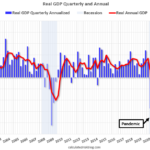Written by Eiichi Tomiura, professor at Otsuma Women’s University. Chairman and Chief Research Officer of the Research Institute of Economy, Trade and Industry (RIETI). Originally published on VoxEU.
Recent trends in world trade have been periods of rapid growth followed by periods of stagnation. As geopolitical tensions increase, trade restrictions are being implemented in the name of national and economic security. This column argues that analyzes of economic security measures should consider multiple dimensions, including their impact on global supply chains, efficiency, costs, foreign direct investment, trade in services, and international competition.
Looking at recent trends in world trade, it appears that the rapid growth of the early part of this century has come to an end and we are entering a phase of stagnation. The factors that caused this paradigm shift should be carefully identified, but include the soaring wages in China, which has provided a large amount of low-wage labor to the global economy since the adoption of reform and opening-up policies in the 1980s, and the Chinese market. Changes in basic policies regarding the economy and international order are having a significant impact.
Conflict between the US and China is intensifying. The Biden administration has not only maintained most of the U.S. tariffs on China that were abruptly imposed under the Trump administration, but also tightened export controls on advanced technology. Gita Gopinath, chief economist of the International Monetary Fund (IMF), has described the current situation as a “second cold war” (Gopinath 2023). It may be accurate to say that we have entered an era of deepening globalization following the end of the US-Soviet Cold War into an era that could be called the Second Cold War.
In fact, trade between the United States and China decreased in 2023, and foreign direct investment (FDI) into China also decreased significantly. Global value chains, which rely on complex international divisions of labor that incorporate imported intermediate goods into exports, are moving into a phase of stagnation or reversal due to their apparent vulnerability to disruption that has emerged in recent years. The conflict between the United States and China has gone beyond the past economic dispute that characterized the Japan-U.S. trade friction, and has escalated to a national conflict with security concerns, including dual-use technology. As a result, the world economy is increasingly divided into a market economy with a well-developed system based on the rule of law, and an economy in which the state is widely and deeply involved in economic and social activities.
In this column, I would like to consider the challenges faced when conducting economic analysis under such circumstances.
Economic analysis of economic security
There seems to be no clear definition of economic security, but it can be defined as ensuring the economic welfare of a nation (the economic aspects of a nation that require protection) or the use of economic measures to ensure national security. I can understand that. National security protection is more relevant to recent debates about economic coercion. Various economic measures have been taken in this regard, but trade restrictions are of paramount importance. When a large country imposes import and export restrictions, the effects on trade are amplified by terms of trade effects.
The main theme of all economic analyzes of economic security is to clarify the extent and nature of the economic impacts of security-oriented measures. A typical example is the analysis of the impact of supply restrictions and import restrictions on production in other countries connected in global supply chains. According to the Ministry of Economy, Trade and Industry’s 2024 Trade White Paper, it is important not only to measure the extent to which a country’s overall trade depends on other specific countries, but also to understand the detailed degree of dependence. Classification of items, level of specific input/output relationships, and degree of dependence.
In addition to directly regulated trade, the broader impacts of reduced efficiency and increased costs due to rerouting and substitution need to be considered. Increasing security requirements narrow the range of options available to businesses to maximize and optimize profits. Additionally, risk reduction measures such as stockpiling are costly. Furthermore, it cannot be overlooked that the benefits of importing a wide variety of products from around the world at low prices have been reduced, placing a heavy burden on consumers and making great sacrifices.
As long as we hope that global conflicts can be managed as cold wars rather than leading to violent fighting as in Ukraine, the scope of regulation should be kept as narrow as possible (“a high fence in a small garden”). (similar to the concept of ). To alleviate the burden of economic security concerns, it is important to continue international division of labor and international trade for a wide range of items that are not considered highly strategic technology.
However, the effects of the global division caused by the Cold War are not limited to trade. One of the defining phenomena of globalization that has taken place since the end of the last century is the rapid increase in FDI. Recently, FDI, especially direct investment in China, has started to decline significantly, and many multinational companies in developed countries (including Japan) do much of their production of goods outside their home countries, so the impact on FDI is has become an important theme along with overseas investment. trade.
Regarding trade, it is important to consider the impact on trade in services, including intellectual property, as well as goods recorded in traditional customs data. Although global trade in goods has entered a period of stagnation, trade in services continues to grow, and the importance of services in the global economy is increasing. Concerns that long-term productivity declines could have a more permanent negative impact than short-term production declines if the distribution of goods, funds, technology, information, and even the workforce are affected. There is.
International competition for foreign investment based on government subsidies to attract production is intensifying, and advanced semiconductors are a prime example of this competition. A wide range of domestic industrial policies are indirectly related to economic security, and care must be taken not to overextend the discussion on economic security. Regarding domestic support measures, it is necessary to deepen consideration of such factors as the economic effects of increasing domestic production, the security risks associated with procurement from like-minded allies, and the necessity and effectiveness of industrial policy intervention itself.
RIETI research activities
The Research Institute of Economy, Trade and Industry (RIETI) conducts research on economic security, with a focus on global supply chains, a characteristic of globalization since the end of the last century. Professor Yasuyuki Todo of Waseda University, Program Director of RIETI’s International Trade and Investment Program, and others point out that in the event of turmoil, domestic production could decline significantly more than imported intermediate inputs. For Japan, using data from Japan’s input-output tables and other sources. In practice, changes in prices and technology lead to substitution of goods from other sources, so in the future it would be useful to conduct and accumulate estimates based on different scenarios.
Although the input-output table compiles detailed data on transactions between industries, it must be kept in mind that the industry figures are ultimately the sum of the average values of different types of companies within the same industry. Given this situation, there is a need to utilize microdata regarding transaction networks at the corporate level. Furthermore, analysis of the impact of security-related export controls on trade flows is closely related to economic security. Senior fellows Hongyong Zhang and Willem Thorbecke have been focusing on this research area at RIETI.
Since economic security consists of themes that are generally unsuitable for economic analysis, RIETI focuses on economic analysis and also engages in legal research related to trade rules, led by Professor Takeshi Kawase. . Sophia University) and their colleagues. With trade restrictive measures increasing in the name of economic security and the dysfunctional WTO dispute settlement mechanism needing to be rebuilt, in-depth discussions are necessary to maintain the rules-based international order. It becomes.
Research cooperation with think tanks from like-minded countries
RIETI conducts research exchanges with think tanks around the world, aiming to conduct high-level research that is globally applicable. In recent years, topics related to economic security have become more prominent in research exchanges with RIETI. Most of the recent international symposiums and workshops held by RIETI are related to economic security. It is important for RIETI to further deepen its research cooperation with think tanks from “like-minded countries” that face similar security environments in mature market economies supported by the rule of law. This is because there are many common themes and issues to analyze. need to be addressed.
Visualization of related research results
In response to these recent circumstances, RIETI is placing emphasis on research on economic security, which is an important issue for Japan’s economy and industry. However, since a comprehensive investigation inevitably takes a great deal of time, RIETI has set up a special feature on economic security on its website. This site highlights and visualizes related research results accumulated by RIETI. We hope this information will be useful for those interested in economic security in their search for relevant information.
The Berlin Wall existed for 30 years from construction to collapse. The progress of globalization continued for about 30 years. Similarly, a number of factors indicate that the current new Cold War between the United States and China is likely to continue for a long time. On the other hand, the security situation is constantly changing, and we need to be prepared for unexpected situations. RIETI hopes to flexibly promote research on economic security through close exchanges of opinions with policy makers, and to promote research that can withstand future academic scrutiny.
Author’s Note: This column is Research Institute of Economy, Trade and Industry (Research Institute of Economy, Trade and Industry).




